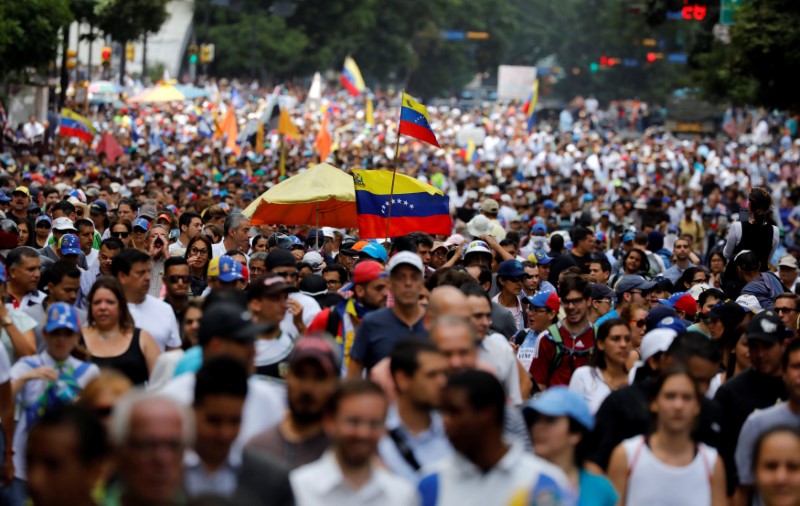
By Andreina Aponte
CARACAS (Reuters) – A Venezuelan military police sergeant shot dead a protester who was attacking the perimeter of an airbase on Thursday, the interior minister said, bringing renewed scrutiny of the force used to control riots that have killed at least 76 people.
At least two soldiers shot long firearms through the fence from a distance of just a few feet at protesters who were throwing rocks, television footage showed.
One man collapsed to the ground and was carried off by other protesters. Paramedics took at least two other injured people to a hospital, a Reuters witness said.
“The sergeant used an unauthorized weapon to repel the attack, causing the death of one of assailants,” Interior minister Nestor Reverol said on Twitter. He said the air force police sergeant faced legal proceedings.
Hundreds of thousands of Venezuelans have taken to the streets in recent months to protest against a clampdown on the opposition, shortages of food and medicine, and President Nicolas Maduro’s plan to overhaul the constitution.
The reaction of the security forces to provocation at marches has been in the spotlight since images showed a national guard member pointing a pistol at demonstrators on Monday, prompting the opposition to intensify its street campaign.
The protesters who attacked the fence outside La Carlota airbase in the wealthy east of Caracas had earlier burned a truck and a motorbike when security forces firing rubber bullets broke up a march destined for the attorney general’s office.
David Jose Vallenilla, 22, died after arriving at a hospital in the Chacao municipality where the protest happened.

Opposition supporters march during a rally against Venezuelan President Nicolas Maduro’s government in Caracas, Venezuela June 22, 2017. REUTERS/Carlos Garcia Rawlins
SHOTS, PETROL BOMBS
A small group of protesters throwing petrol bombs from behind flimsy homemade shields cheered when powerful fireworks used as weapons landed near troops in the airbase. They managed to rip down a section of the fence surrounding the base, despite volleys of tear gas and rubber bullets.
At least one soldier aimed a shotgun through the fence, Reuters pictures showed. The national guard uses shotgun cartridges filled with small rubber pellets against protests.
Reverol said two soldiers were seriously injured by “explosives” the protesters launched, and said shots and petrol bombs hit a primary school on the base during the attack.
Opposition lawmaker Jose Manuel Olivares said Vallenilla had been killed by the national guard firing rubber bullets at point blank range. Olivares, whose arm was wounded in the protest, called for sit-ins on highways on Friday and protests at military bases on Saturday.
Vallenilla suffered wounds to the lungs and heart, a doctor who attended him told Reuters. The attorney general’s office said he was shot three times.
Maduro says the violence is part of a foreign-led plot to overthrow his government and criticizes the opposition for fanning it, however authorities have taken action against three national guard sergeants accused of killing a boy on Monday.
Venezuela’s national guard is a wing of the military charged with internal public order. It mainly uses tear gas, water cannons and rubber bullets to control protests that frequently escalate into riots.
On Monday, a teenager died during another protest in the same area after footage showed a national guard soldier pointing a pistol at protesters.
Maduro moved the head of the national guard to a new position looking after security in the capital after that incident, part of a reshuffle that brought several more military figures into his cabinet.
“I have ordered an investigation to see if there was a conspiracy behind this,” Maduro said earlier on Thursday. He said the men involved in Monday’s shooting had been detained.
The office of the attorney general, a former Maduro loyalist who has turned against him over his push to rewrite the constitution, named three national guard sergeants on Thursday, saying they were charged with homicide for that shooting and that a court had put them in custody.
(Writing by Frank Jack Daniel; Editing by Lisa Shumaker, Richard Pullin and Paul Tait)








